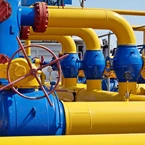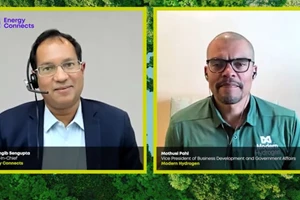Global Oil Execs Are Stuck Between Shareholders and Climate Promises
(Bloomberg) -- At this year’s World Petroleum Congress in Calgary, Canada, about 500 speakers, including Exxon Mobil Corp. Chief Executive Officer Darren Woods and Saudi Energy Minister Abdulaziz bin Salman Al Saud, will tackle topics including decarbonizing hydrogen production and indigenous participation in net zero efforts — fitting for a gathering titled “Energy Transition: The Path to Net Zero.” But the theme runs counter to the song many industry executives are singing.
For them, the security of global energy supplies has become a top priority, thanks to Russia’s war on Ukraine. Investors share those concerns and see a fresh appeal in the oft-maligned business of oil drilling. Shell CEO Wael Sawan has told shareholders his company will play to its strengths by renewing its emphasis on oil and gas production. Rich Kruger, the CEO of Suncor Energy Inc. — based in Calgary, the conference’s host city — said on a recent earnings call that the company will shed its “disproportionate emphasis” on the energy transition and focus on creating value from its oil-sands asset base.
But Richard Masson, chair of the World Petroleum Council in Canada and one of the organizers of this year’s meeting, said the desire to keep energy affordable and shareholders happy need not come at the expense of the environment — an especially acute tension for Canadian drillers, who’ve come under fire for their high emissions and the environmental damage they’ve caused.

“The industry is pushing as hard as it can to try to find ways to meet society’s objectives,” Masson said in an interview. “The question becomes, ‘How do we manage the transition without leaving people in energy poverty?”
For the oil and gas sector, reducing emissions enough to meet global climate targets will require a massive effort. Last year, the production and processing of oil and gas accounted for roughly 15% of global energy-related greenhouse gas emissions, according to a report from the International Energy Agency.
Those emissions would have to fall 60% by 2030, driven by declines in emissions intensity and consumption, the group said. Meeting that target by investing in carbon capture and storage, expanding the use of low-emissions hydrogen, and reducing methane emissions among other things will cost about $600 billion, the IEA said.
Canada-based oil-sands producers, in particular, are feeling the pressure to curb emissions. Global investors, including Norway’s sovereign wealth fund, have in recent years dumped shares of Suncor, Canadian Natural Resources Ltd. and Cenovus Energy Inc., prominent Canadian oil-sands companies, over climate concerns.
In response, the companies formed the Pathways Alliance, which mapped out a way for the industry to zero out the emissions from its production. The plan relies on a massive carbon capture system financed largely by C$12.4 billion ($9.1 billion) in government funds.
“We’re doing this because markets are driving us to do this,” Kendall Dilling, president of the Pathways Alliance, said in an interview. “If we can’t get on a path to decarbonization, it’s going to be harder and harder to secure financing and insurance for operations and all those things.”
Even if the Canadian government funds the oil-sands’ carbon capture system, the industry still faces threats in a world that’s working to reduce the 80% of emissions that come from burning oil, not just the 20% generated by producing it, said Duncan Kenyon, director of corporate engagement for Investors for Paris Compliance, which holds companies accountable to climate pledges.
“More than ever before, there is really a massive business risk for them because they’re higher cost producers, they have high-cost options to deal with their carbon and there’s definitely demand erosion occurring,” Kenyon said in an interview.
For Lisa Baiton, CEO of the Canadian Association of Petroleum Producers, the World Petroleum Congress offers Canadian drillers a chance to show the global industry the progress they’ve made towards reducing emissions while highlighting to a domestic audience the innovations local players have devised.
“It’s a really great place to solidify a vision for Canada as being among the most responsibly produced energy in the world and seize the opportunity to be competitive globally and have all of those benefits economically come back to Canada,” Baiton said.
©2023 Bloomberg L.P.
KEEPING THE ENERGY INDUSTRY CONNECTED
Subscribe to our newsletter and get the best of Energy Connects directly to your inbox each week.
By subscribing, you agree to the processing of your personal data by dmg events as described in the Privacy Policy.
More gas & LNG news

ADNOC Drilling secures $1.7 billion contract to unlock UAE’s unconventional energy resources
May 14, 2024
TechnipFMC lands substantial iEPCI contract from Woodside Energy for Xena Phase 3 Development
May 14, 2024
Europe’s Gas Supply Once Again Hinges on One Company
May 13, 2024
Equinor enters into partnership with Standard Lithium to better deliver energy transition enabler
May 13, 2024
QatarEnergy to acquire two new exploration blocks offshore Egypt
May 13, 2024
ADNOC Drilling revenue hits $886 million in Q1 2024, introduces new dividends policy
May 13, 2024
Mubadala Energy confirms second consecutive significant gas discovery in Indonesia’s South Andaman
May 13, 2024
YPF’s $2.5 Billion Shale Oil Pipeline Moves Ahead After Approval
May 10, 2024
South Africa May Curb Shell’s Oil Exploration Over Gas-Pump Exit
May 10, 2024
A Drug for Cows Could Curb Methane Emissions from Meat and Dairy
May 10, 2024
Hydrogen economy set for rapid global growth
May 01, 2024
Public-private energy partnerships critical to hit global net zero targets, says former head of IEA
Apr 25, 2024
Deploying computational chemistry to speed up the energy transition
Mar 18, 2024
Why the energy industry is on the cusp of disruptive reinvention
Mar 12, 2024
Bio-energy to play a key role in shaping the energy transition
Mar 12, 2024
More women in energy vital to the industry’s success
Mar 06, 2024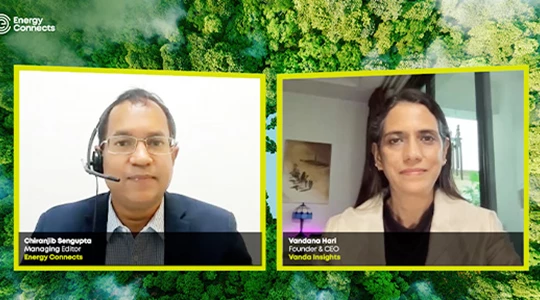
India’s energy sector presents lucrative opportunities for global companies
Jan 31, 2024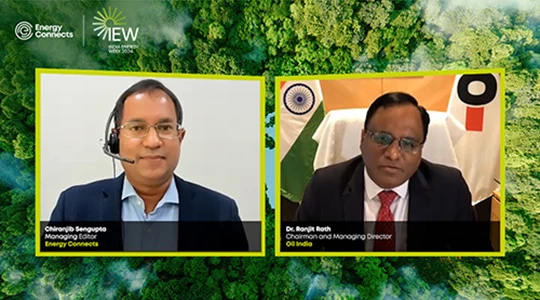
Oil India charts the course to ambitious energy growth
Jan 25, 2024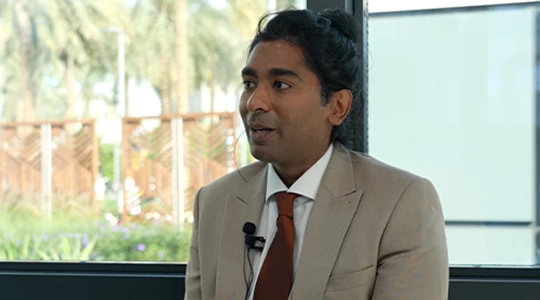
Maritime sector is stepping up to the challenges of decarbonisation
Jan 08, 2024
COP28: turning transition challenges into clean energy opportunities
Dec 08, 2023Partner content

Ebara Elliott Energy offers a range of products for a sustainable energy economy

Essar outlines how its CBM contribution is bolstering for India’s energy landscape

Positioning petrochemicals market in the emerging circular economy

Navigating markets and creating significant regional opportunities with Spectrum

















